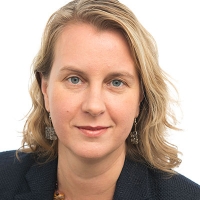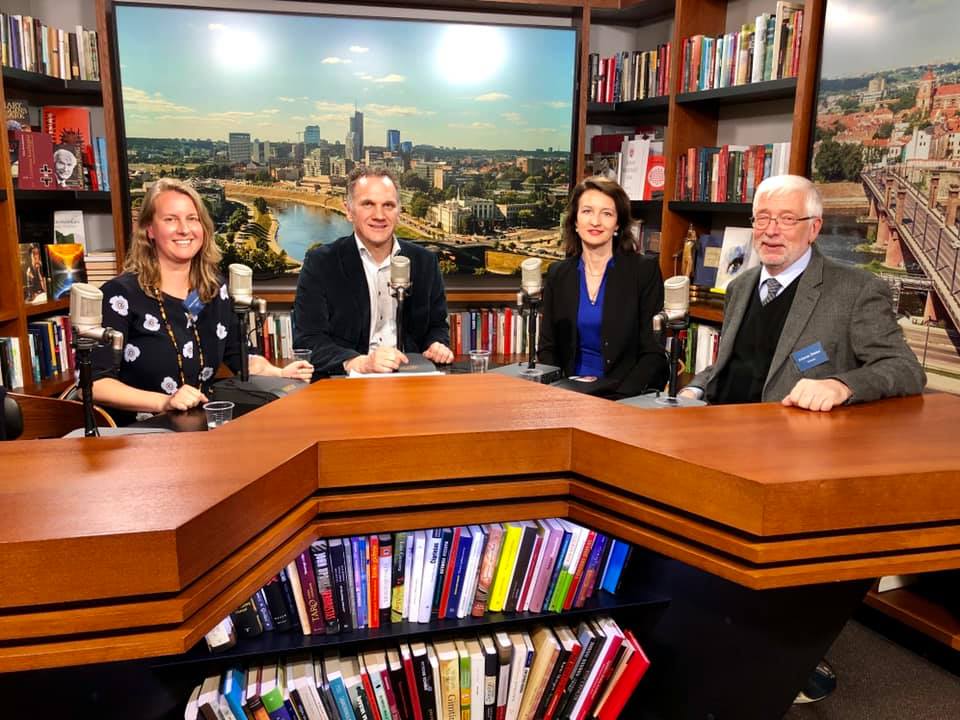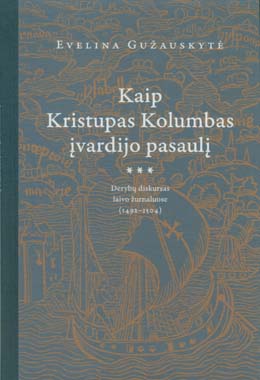
eguzausk@wellesley.edu
(781) 283-2902
Spanish & Portuguese
B.A., Middlebury College; M.A., M.Phil., Ph.D., Columbia University
Green Hall 333
Evelina Gužauskytė
Associate Professor of SpanishSpecializes in gender, race, and philosophy of language in colonial Latin American literature and visual culture; digital humanities and blended learning; history of clothing and of food; cultural exchanges between Eastern Europe and Latin America.
My first book, Christopher Columbus’s Naming in the diarios of the Four Voyages (1492-1504): A Discourse of Negotiation (Toronto: University of Toronto Press, 2014) undertakes an in-depth study of Columbus’s naming of places – islands, capes, mountains, and rivers – during his four voyages of exploration and conquest to the islands in the Caribbean Basin and the mainland of South America. Its goal is to offer new textual evidence about the voyages, Columbus’s convictions and desires, as well as the influence that the native Taino inhabitants had on Columbus’s way of seeing the Americas and of the itineraries of his voyages.
The first stage in the research process was to compile the list of the 256 known place names Columbus had authored or appropriated as documented in the diarios of the four voyages and other historical sources that document the voyages. This list is included in the book’s Appendix. Next, I undertook a close study of the literal, symbolic, spiritual, and other meanings and connotations of these place names. Through an analysis of the toponymic clusters that emerge, the book uncovers the alchemical, cosmological, nautical, aesthetic, spiritual concepts as well as the patterns of symmetry and the concepts of centrality inscribed onto the Caribbean landscape and seascape. The book also argues that Columbus’s naming was profoundly impacted by the encounters with the native inhabitants. It traces how the linguistic and material exchanges with the native Taino speakers as documented in the substantial list of place names Columbus had appropriated from from Taino, Igneri, and Island Carib languages.
My second book, with the working title, Imperial Gaze, Local Narratives: The Politics of Female Fashion in Eighteenth-century New Spain casta Paintings, studies the depictions of women’s garments and bodies in eighteenth-century New Spain (today Mexico) casta paintings. Its goal is to gain a deeper understanding of the role that gender – both performed and imagined – played in expressing the tension between the imperial gaze and the agency of the local subject on the eve of the Latin American Independence movements. Why do artists dedicate so much attention to depicting female garb in painstaking detail, ranging from opulent and stylish to the poorest of rags? Are indigenous women consistently represented wearing native-style dresses and are European-style fashions reserved for white and mulata protagonists? Or is there a greater cultural complexity woven into the fashion styles, the racially mixed bodies that wear them, and fabrics represented? What can we learn from the performative ways in which the women are wearing their outfits? To answer these and other questions, my book will explore female clothing and body as a juncture between the lived experience, the artist’s mind, and the politics and the rhetoric of fashion.
I have also recently published articles in journals such as Colonial Latin American Review, Bulletin of Spanish Studies, Hispanófila, Revista de Estudios Hispánicos, The Early Modern Women: An Interdisciplinary Journal, and Metai. My research and translations have been supported by the grants from the National Endowment for the Humanities, Andrew W. Mellon Foundation, Ministry of Culture and Sports of Spain, Lithuanian Ministry of Education, Lithuanian Ministry of Culture, Lithuanian Council of Culture, Open Society Soros Foundation, and the European Commission Translation grants. I have carried out research at the John Carter Brown Library (Providence, U.S.), the Universidad Nacional Autónoma de México (Mexico City, Mexico), the Escuela de Estudios Hispano-Americanos (Seville, Spain), and the Archivo General (Seville, Spain). As an extension of my scholarly research, I translate literature and poetry from Spanish and English into Lithuanian, and I have participated in residency programs in the Hispanic Center for Literary Translation, Casa del Traductor (Tarazona, Spain) and Casa dei Traduttori Litterari (Procida, Italy).
In the courses I teach, my students and I delve into topics related to colonial Mexico, Peru, and the early Caribbean. We explore subjects such as the depictions of fashion in colonial Latin American literature and visual culture, the cultural history of clothing and food, the early mapping of the Americas, and the multiplicity of voices that speak about identity, otherness, and lived experiences during the colonial period, with a particular interest on colonial and pre-Columbian women and the myths that surround them. My courses incorporate innovative and interdisciplinary methodological approaches including those based in comparative literature, the digital humanities, and public speaking. In addition, my courses continuously challenge concepts of territorial boundaries in particular in the context of literary, visual, and other cultural traditions. For example, my senior seminar, Migration, Identity, Heritage: Latin America and Eastern Europe, explores the cultural exchanges between two parts of the world that are seemingly disconnected but that in fact have many connections in the world of literature, the arts, and culture.
An important area of intellectual exploration has been in the digital humanities and blended learning. Since 2014, I have been serving as the inaugural Faculty Director of the Andrew W. Mellon Blended Learning Initiative. I worked with the Provost’s Office, Library and Technology Services, and the Pforzheimer Teaching and Learning Center, to develop a vision for blended learning and the digital humanities at Wellesley College. In collaboration with the Provost’s Office, we also launched the Digital Humanities Pilot Program in 2017. Throughout my tenure as the faculty director, I have communicated with faculty about the opportunities available through the initiative; consulted faculty on individual projects in development; evaluated project proposals and provide feedback; facilitated assessment projects; and attended conferences and intercollegiate meetings. Thanks to generous funding, more than 50 faculty, representing 21 academic departments, partnered with Library and Technology staff, spearheaded projects and revisited their teaching and scholarship with the help of digital tools and methods. Over 65 course-related projects in the humanities and interdepartmental projects have been supported; and 12 out of 15 foreign languages taught at the College have adopted blended learning methods. Our work has been covered generously in the news.
As the Faculty Director of the Blended Learning Initiative I have also helped faculty and students learn more about blended learning. The Blended Learning Speaker Series have brought speakers to campus to offer talks, workshops, and class visits. Our mid-initiative event, Discussing the Digital Liberal Arts consisted of a faculty project showcase, producing a video collage, and a faculty panel discussion. With the help of the advising committee and LTS staff, I organized our capstone two-day symposium, Shifting (the) Boundaries: Blended Learning, Digital Humanities, and the Liberal Arts (April 6-7, 2018) which was an opportunity for our community and guest participants to take stock of the current state of blended learning and the digital humanities, both at our institution and across academia. We reflected both on our active participation in negotiating the spatial, disciplinary, and methodological boundaries in our scholarship and teaching, as well as on the broader perspectives of how digital methods are transforming humanistic practices across academia.
I am also involved in the research, creative writing, and public advocacy communities in my family’s country, Lithuania. In fall 2018, I was honored to serve on the international humanities expert panel which was charged to undertake a comprehensive overview of the humanities research in Lithuania as part of the national research reform. The panel conducted a thorough overview of materials and site visits at 22 universities and research institutions in the country. Our written evaluations and recommendations were used to enhance research quality, implement structural reforms, and make Lithuanian research more visible internationally. In Spring 2019, I was invited to participate in the first Lithuanian World Writers congress, and to speak on national radio on the subject of the national referendum regarding double citizenship.
I spend my free time with my husband and two young daughters. We love hiking, biking, and swimming in the Morses pond.
Publications
Books:
Colonial Gaze, Local Narratives: Gender and Fashion in Eighteenth-century New Spain casta Paintings. Book manuscript in progress.
Blended Learning in the Liberal Arts. Edited volume in preparation. Proposal under review at Johns Hopkins University Press.
Kaip Kristupas Kolumbas įvardijo pasaulį: Derybų diskursas laivo žurnaluose (1492–1504). Trans. Miglė Anušauskaitė (English to Lithuanian). Vilnius, Lithuania: Homo Liber, 2017.
Christopher Columbus’s Naming in the diarios of the Four Voyages (1492-1504): A Discourse of Negotiation. Toronto: University of Toronto Press, 2014.
Articles:
“Fowl Play: The Symbolism of Birds in Some Eighteenth-century Mexican Casta Paintings.” In The challenge of the object: 33rd congress of the International Committee of the History of Art, Nuremberg, 15th - 20th July 2012 (Die Herausforderung des Objekts: 33. Internationaler Kunsthistoriker-Kongress/ CIHA 2012, Nürnberg. Germanisches Nationalmuseum), edited by Georg Ulrich Großmann and Petra Krutisch, 1199-1201. Nuremberg: Verlag des Germanischen Nationalmuseums, 2013.
“Stars of the Sky, Gems of the Earth: Place Names Related to ‘Planets’ and Metals in Columbus’s Diario.” Colonial Latin American Review. Vol. 18, No. 2, August 2009, pp. 261-282.
“Fragmented Borders, Fallen Men, Bestial Women: Violence in New Spain Eighteenth-Century Casta Paintings.” Bulletin of Spanish Studies. Vol. 86, No. 2, March 2009, pp. 175-204.
Reviews:
Book review: Willingham, Elizabeth M. The Mythical Indies and Columbus's Apocaliptic Letter: Imagining the Americas in the Late Middle Ages. Chicago: Sussex, 2016. 394 pp. Review invited by Hispanófila (the University of North Carolina, Chapel Hill). Submitted.
Scholarly website review: The Recipes Project: Food, Magic, Art, Science, and Medicine. The Early Modern Women: An Interdisciplinary Journal (edited by Anne J. Cruz, Mary Lindemann, and Mihoko Suzuki, University of Miami). Spring 2017 (11.2). 161-165.
Book review: Myers, Kathleen Ann. Fernández de Oviedo's Chronicle of America: A New History for a New World. Review invited by Revista de Estudios Hispánicos (Washington University, St. Louis). Winter 2009.
Other:
“Jonas Mekas: Moira vyniojo siūlus ir dainavo” (“Jonas Mekas: As She Spun, Moira Sang”). Conversation with the Lithuanian-American avant-garde filmmaker, film critic, and author, Jonas Mekas. Metai (Lithuanian Writers’ Union: Vilnius, Lithuania). December 2014, pp. 92-97.
Zajac, Tom, and Evelina Guzauskyte. “Texts and translations.” Translations of 14 eighteenth-century song texts from the manuscript by Baltasar Jaime Martínez Compañón, the Bishop of Trujillo, Peru (1737-1797). Printed program for performances by Collegium Musicum.
“Mano Nevarėnai” (essay) (“My Nevarėnai”). Nevarėnai: istorija ir dabartis (Nevarėnai: History and Present), Homo Liber: Vilnius, Lithuania, 2006, pp. 72-74.
“Translator’s Introduction.” Avellaneda, Gertrudis Gómez. Sab. Trans. Evelina Gužauskytė. Vilnius: Alma Littera. 1998.
Publicity and interviews:
“Pirmasis pasaulio lietuvių rašytojų suvažiavimas” (The First World Lithuanian Writers Congress”). Interviewee. Draugas: Lithuanian World Wide News. Chicago, May 16, 2019.
“Apie literatūrinį pasaulį su lietuvišku akcentu” (“About Literary World with a Lithuanian Accent.”). Metai. Interviewee. Vilnius, Lithuania. Print and online. May 14, 2019.
“Ko reikia Lietuvos ateičiai – daugiau „dvigubų“ piliečių ar mažiau?” (“What Does Lithuania Need in the Future – More Citizens with Double Citizenship or Less?”). Discussant on the national referendum in a 1.5 hour-long live radio program. Žinių Radijas (Radio News station).
Jastramskienė, Loreta. “Kolumbo atradėja” (“Uncovering Columbus”). Interview about the Lithuanian translation of my book Christopher Columbus’s Naming in the diarios of the Four Voyages (1492-1504): A Discourse of Negotiation. IQ-Lithuania magazine. Print. June, 2018. Online. July 2018.
“Symposium Celebrates Four Years of Wellesley’s Innovative Blended Learning Initiative.” Article about the Blended Learning Initiative capstone symposium, Shifting (the) Boundaries: Blended Learning, Digital Humanities, and the Liberal Arts. Wellesley News, April 23, 2018.
“Humanities, Meet Technology.” Interview by Catherine O’Neill Grace about creative applications of digital tools to teaching the humanities. The Wellesley Alumnae Magazine. Winter 2018.
“How Cultures That Are Worlds Apart Create New Dialogues.” Article about new course, SPAN 321 “Migration, Heritage, Identity: Eastern Europe and Latin America,” and the ways it integrates a collaborative digital scholarship project to complement a “traditional” research paper. Wellesley News, April 23, 2015.
Literary Translations:
Stevenson, Robert Louis. Nepaprasta Daktaro Džekilo ir Misterio Haido Istorija (The Strange Case of Dr. Jekyll and Mr. Hyde). Trans. Evelina Guzauskyte. Vilnius: Homo Liber, 2002.
Pérez-Reverte, Arturo. Flamandų paveikslas (La tabla de Flandes). Trans. Evelina Guzauskyte. Vilnius: Alma Littera, 2002.
Allende, Isabel. Dvasių namai (La casa de los espíritus). Trans. Evelina Guzauskyte. Vilnius: Alma Littera, 1999. Reprinted in 2000, 2001, 2002, 2003, 2004, 2005, 2006, 2007, 2008, 2009, 2010, 2012, 2015, 2016.
Avellaneda, Gertrudis Gómez. Sabas (Sab). Trans. Evelina Guzauskyte. Vilnius: Alma Littera. 1998.
Hemingway, Ernest. Pavojinga vasara (Dangerous Summer). Trans. Evelina Guzauskyte. Vilnius: Gamta, 1995.
Hailey, Arthur. Viešbutis (Hotel). Trans. Evelina Guzauskyte. Vilnius: Gamta, 1994.
Courses:
SPAN 201 and 202. Intermediate Spanish I and II.
SPAN 241. Introduction to Hispanic Culture. Section topic: Fantasy and Reality in Literature, Art, and Multimedia. Ann E. Maurer '51 Speaking Intensive Course.
SPAN 245 Maps and Minds: Inventing the Americas Through Geographic Imagination. Andrew W. Mellon Digital Humanities Course.
SPAN 271. Intersecting Currents: Afro-Hispanic and Indigenous Writers in Latin American Literature
SPAN/LAST 273. Latin American Civilization and Culture
SPAN/LAST 279. Female Fashion in Colonial Latin America
SPAN 291. Goddesses, Muses, Warriors: Women in Pre-Hispanic and Colonial Latin America
SPAN 307. The Clothed and the Naked in Colonial Latin America
SPAN 321. Migration, Heritage, Identity: Eastern Europe in Latin America
SPAN 325. Candid Cuisine: Food in Latin American Literature and Culture



